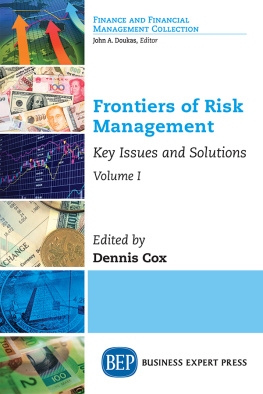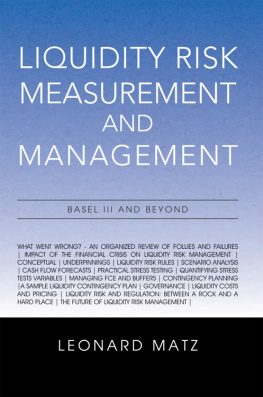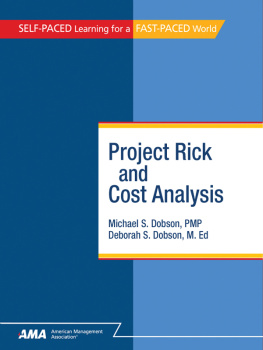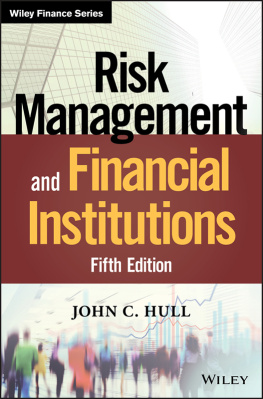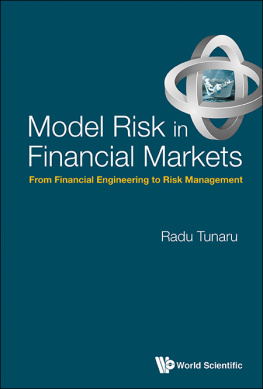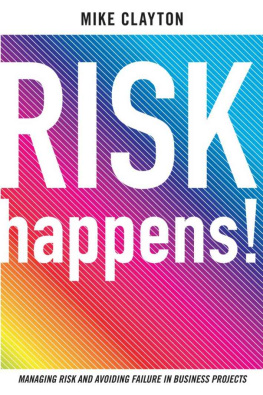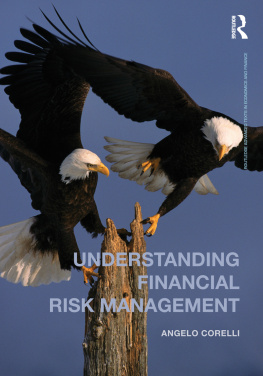Cover
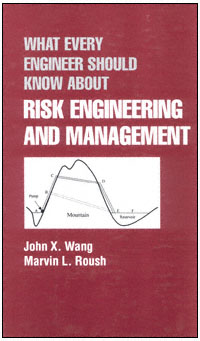
| title | : | What Every Engineer Should Know About Risk Engineering and Management What Every Engineer Should Know ; V. 36 |
| author | : | Wang, John X.; Roush, Marvin L. |
| publisher | : | CRC Press |
| isbn10 | asin | : | 0824793013 |
| print isbn13 | : | 9780824793012 |
| ebook isbn13 | : | 9780585377315 |
| language | : | English |
| subject | Reliability (Engineering) , Risk assessment, Risk management. |
| publication date | : | 2000 |
| lcc | : | TA169.W36 2000eb |
| ddc | : | 620/.00452 |
| subject | : | Reliability (Engineering) , Risk assessment, Risk management. |
Page a
WHAT EVERY ENGINEER SHOULD KNOW ABOUT
RISK ENGINEERING AND MANAGEMENT
Page b
WHAT EVERY ENGINEER SHOULD KNOW
A Series
Editor
William H. Middendorf
Department of Electrical and Computer Engineering
University of Cincinnati
Cincinnati, Ohio
- What Every Engineer Should Know About Patents, William G. Konold, Bruce Tittel, Donald F. Frei, and David S. Stallard
- What Every Engineer Should Know About Product Liability, James F. Thorpe and William H. Middendorf
- What Every Engineer Should Know About Microcomputers: Hardware/Software Design, A Step-by-Step Example, William S. Bennett and Carl F. Evert, Jr.
- What Every Engineer Should Know About Economic Decision Analysis, Dean S. Shupe
- What Every Engineer Should Know About Human Resources Management, Desmond D. Martin and Richard L. Shell
- What Every Engineer Should Know About Manufacturing Cost Estimating, Eric M. Malstrom
- What Every Engineer Should Know About Inventing, William H. Middendorf
- What Every Engineer Should Know About Technology Transfer and Innovation, Louis N. Mogavero and Robert S. Shane
- What Every Engineer Should Know About Project Management, Arnold M. Ruskin and W. Eugene Estes
- What Every Engineer Should Know About Computer-Aided Design and Computer-Aided Manufacturing: The CAD/CAM Revolution, John K. Krouse
- What Every Engineer Should Know About Robots, Maurice I. Zeldman
- What Every Engineer Should Know About Microcomputer Systems Design and Debugging, Bill Wray and Bill Crawford
- What Every Engineer Should Know About Engineering Information Resources, Margaret T. Schenk and James K. Webster
- What Every Engineer Should Know About Microcomputer Program Design, Keith R. Wehmeyer
- What Every Engineer Should Know About Computer Modeling and Simulation, Don M. Ingels
- What Every Engineer Should Know About Engineering Workstations, Justin E. Harlow III
Page c
- What Every Engineer Should Know About Practical CAD/CAM Applications, John Stark
- What Every Engineer Should Know About Threaded Fasteners: Materials and Design, Alexander Blake
- What Every Engineer Should Know About Data Communications, Carl Stephen Clifton
- What Every Engineer Should Know About Material and Component Failure, Failure Analysis, and Litigation, Lawrence E. Murr
- What Every Engineer Should Know About Corrosion, Philip Schweitzer
- What Every Engineer Should Know About Lasers, D. C. Winburn
- What Every Engineer Should Know About Finite Element Analysis, edited by John R. Brauer
- What Every Engineer Should Know About Patents: Second Edition, William G. Konold, Bruce Tittel, Donald F. Frei, and David S. Stallard
- What Every Engineer Should Know About Electronic Communications Systems, L. R. McKay
- What Every Engineer Should Know About Quality Control, Thomas Pyzdek
- What Every Engineer Should Know About Microcomputers: Hardware/Software Design, A Step-by-Step Example. Second Edition, Revised and Expanded, William S. Bennett, Carl F. Evert, and Leslie C. Lander
- What Every Engineer Should Know About Ceramics, Solomon Musikant
- What Every Engineer Should Know About Developing Plastics Products, Bruce C. Wendle
- What Every Engineer Should Know About Reliability and Risk Analysis, M. Modarres
- What Every Engineer Should Know About Finite Element Analysis: Second Edition, Revised and Expanded, edited by John R. Brauer
- What Every Engineer Should Know About Accounting and Finance, Jae K. Shim and Norman Henteleff
- What Every Engineer Should Know About Project Management: Second Edition, Revised and Expanded, Arnold M. Ruskin and W. Eugene Estes
- What Every Engineer Should Know About Concurrent Engineering, Thomas A. Salomone
- What Every Engineer Should Know About Ethics, Kenneth K. Humphreys
- What Every Engineer Should Know About Risk Engineering and Managment, John X. Wang and Marvin L. Roush
ADDITIONAL VOLUMES IN PREPARATION
Page i
WHAT EVERY ENGINEER SHOULD KNOW ABOUT
RISK ENGINEERING AND MANAGEMENT
John X. Wang
General Electric Company
Erie, Pennsylvania
Marvin L. Roush
University of Maryland
College Park, Maryland

Page ii
ISBN: 0-8247-9301-3
This book is printed on acid-free paper.
Headquarters
Marcel Dekker, Inc.
270 Madison Avenue, New York, NY 10016
tel: 212-696-9000; fax: 212-685-4540
Eastern Hemisphere Distribution
Marcel Dekker AG
Hutgasse 4, Postfach 812, CH-4001 Basel, Switzerland
tel: 41-61-261-8482; fax: 41-61-261-8896
World Wide Web
http://www.dekker.com
The publisher offers discounts on this book when ordered in bulk quantities. For more information, write to Special Sales/Professional Marketing at the headquarters address above.
Copyright 2000 by Marcel Dekker, Inc. All Rights Reserved.
Neither this book nor any part may be reproduced or transmitted in any form or by any means, electronic or mechanical, including photocopying, microfilming, and recording, or by any information storage and retrieval system, without permission in writing from the publisher.
Current printing (last digit):
10 9 8 7 6 5 4 3 2 1
PRINTED IN THE UNITED STATES OF AMERICA
Page iii
Preface
Engineering of systems always involves a variety of elements of risk, especially when an undertaking is the first of its kind. A large-scale engineering design can fail in many ways and the failure modes are sometimes difficult to completely anticipate due to the system complexity. Since the objective of engineering is to design and build things right the first time, knowledge of how to manage technical risk efficiently and effectively can be quite important.
The development of engineering has been a cumulative process and so is the progress of risk engineering and management. The long history of engineering has left us a rich collection of examples, both in terms of successes and failures. In this book, we have used a few selected examples as the starting point of individual chapters. It is our hope that these examples will help the readers to understand some of the ways in which engineering systems can fail, the effects that these failures may impose, and the opportunities that engineers have to turn failure into success.
Next page

